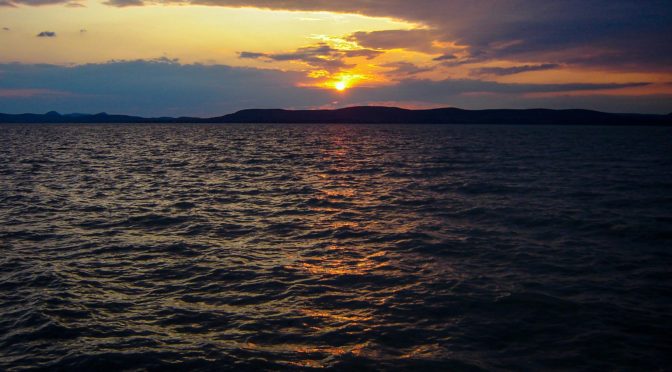Lake Balaton is the largest freshwater lake in Central Europe and historically one of Hungary’s most popular tourist destinations.
In 2011 we discovered that, as elsewhere in the country, the severe economic depression with high unemployment rates meant little extra cash to spend on holidays. Coupled with extortionate fuel prices, people were simply not willing to travel to the otherwise bustling summer resort.

It was a marked contrast to neighbouring Slovenia which we had discovered was fixing its sights firmly towards Brussels and enjoying significant infrastructure funding from the EU.
We had entered Hungary before we were ready to and narrowly avoided a stiff penalty fine by stopping at an incongruous cabin off the main M7 toll and buying a vignette to travel legally on the road network.

It was early July and antiquated machinery toiled in the fields harvesting and silaging across huge acres. As we got closer to the lake the rural landscape changed to a vast urban conurbation of single-story cabin style homes.
These were the tourist resorts built to accommodate the expected thousands of Hungarian families that spent their annual two weeks’ holiday allowance at the lake. It was eerily quiet.
Seeing us pass in Bertha, hopeful shop keepers and restaurant owners waved enthusiastically, and we felt guilty at driving on past them towards our advertised campsite.

Tall, rusty iron gates and a broken sign didn’t instil much confidence, but we were met with a warm welcome and asked to pick our own pitch by the side of the waters.
It was mid-afternoon so we ventured out on our bikes for views of the massive expanse of lake, where whipped up grey waves rolled onto the shores in a stiff breeze.

Pedalling along the empty tourist train track we followed the noise of voices and cheering. It was our ‘trip luck’ to happen upon the local community’s annual festival of traditional dancing and folklore.
A sumptuously dressed man in military dress uniform wore long leather boots and seemingly sporting a fox around his neck. He called out the order of the afternoon’s entertainment from a stage erected by the lakeside. Row upon row of empty chairs faced him forlornly.


We did our bit and gamely sat in the front row clapping and cheering the enthusiastic displays of singing and dancing by schoolchildren.
The girls wore blouses beautifully embroidered with traditional Kalocsa patterns and spun like wooden tops in large, pleated skirts. Each had a small flowery bonnet to cover their hair and a pair of polished black shoes.

A grumpy chef dished up hot paprika-laden goulash from the smallest of several cooking bowls set aside for the occasion. He spoke English and told us he was unhappy by the lack of people visiting the festival.
He gave us a hearty portion to share and we guzzled and coughed our way through the peppery stew whilst enjoying a boot slapping display by two men determined to out spin and out leap each other upon the stage.

A break in the programme gave us the opportunity to cycle back as the sun came down. It had been a fascinating and unexpected afternoon and one which we talked late into the night about over a jar of ajvar and a bottle of Bikaver, or Bulls Blood.
We would find out the history behind the wine in a few days’ time.


